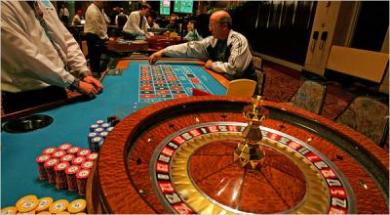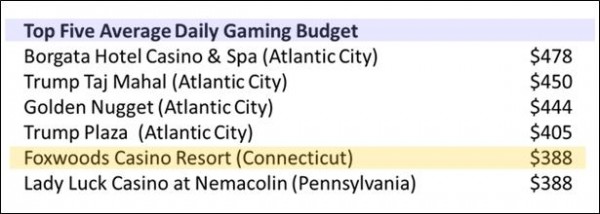Frequent Gamblers Prefer Atlantic City; Connecticut Casino Customers Satisfied As Competition Grows
/
A new study shows that the Atlantic City casinos continue to lead the way in attracting the gamblers who visit casinos most often, but Connecticut’s casinos are not far behind. The review of players club members at casinos throughout the mid-Atlantic region reflects an industry becoming more competitive as frequent gamblers have more choices. The study found that

- the region’s biggest gamblers are playing in Atlantic City, NJ
- frequent gamblers at Connecticut's casinos bring more than $300 to gamble
- gamblers frequenting upstate New York casinos have the lowest daily gaming budget in the Mid-Atlantic region
- table gamblers generally have an average gambling budget of almost twice that of slots player,
- 35-44 year olds bring the most gambling money to the casinos.
The casino markets included in the survey were New York, New Jersey, Pennsylvania, Connecticut, Delaware, Maryland and Massachusetts. The survey, called Casino SCORES, conducted 3,000 interviews with individuals who live in one of the states, had made at least three visits to a casino in the region during the past year, and were members of at least one players club.
The study asked gamblers their average d aily gaming budget when going to casinos in the region. Of the 43 casinos evaluated in the study, the highest daily gaming budgets were among individuals that go to the Atlantic City casinos most often, followed by Foxwoods in Connecticut and Lady Luck Casino at Nemacolin Resort in Pennsylvania.
aily gaming budget when going to casinos in the region. Of the 43 casinos evaluated in the study, the highest daily gaming budgets were among individuals that go to the Atlantic City casinos most often, followed by Foxwoods in Connecticut and Lady Luck Casino at Nemacolin Resort in Pennsylvania.
The top five average daily gaming budgets were: Borgata Hotel Casino & Spa (Atlantic City), $478; Trump Taj Mahal (Atlantic City), $450; Golden Nugget (Atlantic City), $444; Trump Plaza, (Atlantic City), $405; and Foxwoods Resort Casino (Connecticut), and Lady Luck Casino at Nemacolin (Pennsylvania), both at $388. Mohegan Sun was further down the list at $324, but well above the majority of casinos. The bottom five, all in New York, ranged from $205 down to $120 average daily individual gaming budgets.
The Average Daily Gaming Budget among those who said they play table games most often was $493, compared with $250 among those who responded that they play slots most often.
The survey also found that the 35-to-44 year old age bracket brings the most money with them to the casino they visit most often, compared with other age groups. 21 to 34 - $334 35 to 44 - $359 45 to 64 - $308 65 and over - $288
Among those surveyed who had joined at least one casino's players club, 41 percent did so at an Atlantic City casino, 31 percent were members of Mohegan Players Club, and 25 percent joined Foxwoods Rewards. Membership overlapped, as some individuals surveyed were members of more than one players program.
Competition To Retain, Attract Frequent Gamblers Intensifying
With Massachusetts moving forward with its casino licensing process, the region will continue to see heightened competition in the coming years. A new casino opened in Maryland last year, and two more are planned in the next three years. The increasing competition is already having an impact on the revenue stream to the state in accordance with longstanding exclusivity agreements. At the end of the fiscal year last summer, the two Connecticut casinos sent a total of $296.4 million to the state, a drop of almost $48 million from fiscal 2012.
Massachusetts’ regulators recently awarded a slot parlor license to Plainridge Racecourse which is just 20 miles from Twin River Casino in Lincoln, Rhode Island. The Massachusetts gambling commission expects to award the license for Western Massachusetts in May, with an MGM proposal for Springfield the only project left in the running after a Mohegan Sun proposal was defeated in a local referendum in nearby Palmer. In addition, two proposals are competing for the license in the greater Boston region, Mohegan Sun in Revere and Wynn Resorts in Everett.
“As competition heats up,  keeping and growing loyalty is going to be key,” said John Antonello, Managing Director of Travel and Leisure Entertainment for Phoenix Marketing International (PMI). “The more perks that are provided, the better.” The trend is for loyalty programs to get “more sophisticated, so they can extend their reach,” Antonello added.
keeping and growing loyalty is going to be key,” said John Antonello, Managing Director of Travel and Leisure Entertainment for Phoenix Marketing International (PMI). “The more perks that are provided, the better.” The trend is for loyalty programs to get “more sophisticated, so they can extend their reach,” Antonello added.
Both Foxwoods and Mohegan Sun players club members indicated a “good level of satisfaction,” with the benefit program currently offered,” Antonello said, reflecting program elements including restaurant dining and shopping discounts, complementary hotel rooms on-site, reserved parking, VIP check-in and special gaming events. Mohegan Sun, for example, offers three levels of benefits to cub members, Foxwoods offers five.
The data offered in the survey also includes cross-tabulations that indicate to which loyalty programs in other industries the club members at specific casinos belong – which can provide individual casinos a road map suggesting which perks might be most attractive to their existing customers. For example, 37 percent of Foxwoods club members are also members of Marriott Rewards, and one-third are members of airline pr ograms, such as Delta, American or JetBlue. Those aspects of the survey are proprietary, and available to clients of Phoenix.
ograms, such as Delta, American or JetBlue. Those aspects of the survey are proprietary, and available to clients of Phoenix.
Antonello said that players club programs are rapidly evolving, and are reminiscent of the hotel loyalty programs of just over a decade ago, when they aggressively began adding new perks to retain customers amidst growing competition. “Casinos are now looking for partnerships with other entertainment and travel companies as they go after a broader audience. The trend is to go beyond one industry,” he said. Foxwoods Rewards partners program, for example, now includes discounts at businesses ranging from FTD Florist to Mystic Acquarium and the Connecticut Science Center.
Completed interviews were conducted in December 2013 in proportion to each state’s population and all counties within each state were represented. Phoenix expects to repeat the survey later in the year. Additional information is available at casinoscores@phoenixmi.com































